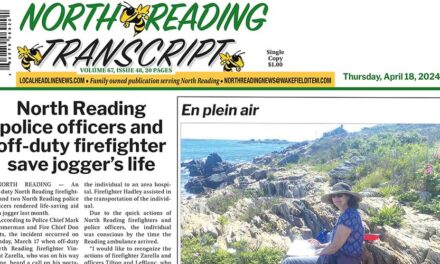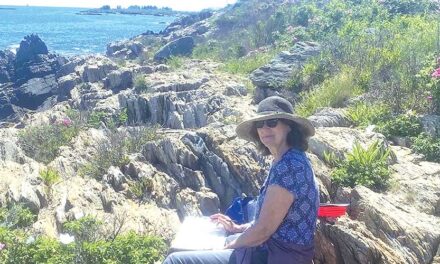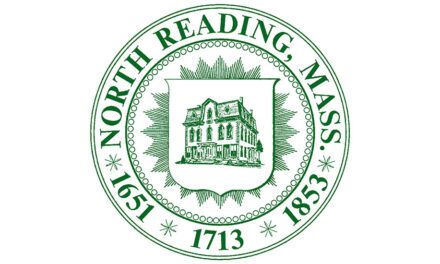Published January 14, 2021
By ALLIE HASTINGS
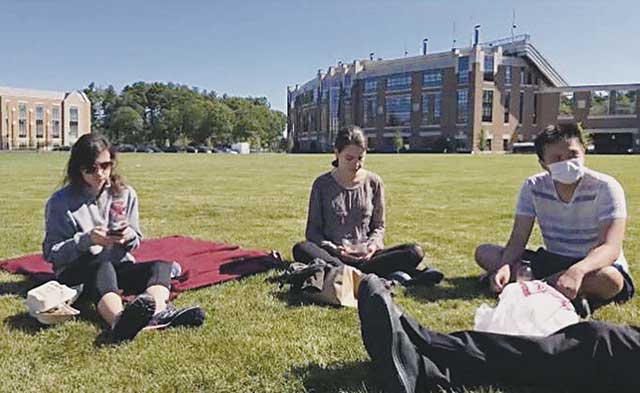
NORTH READING — When COVID-19 first took the country by storm in March of 2020, schools all across the United States shut down, tasking teachers and professors with the mission to finish off their spring terms remotely in accordance with CDC guidelines. As the year started to approach the fall months and a new school semester, many undergraduate students were left to wonder what kind of decision their college or university might make – would they be forced to take Zoom classes from home, or be encouraged to return? And if they chose to live on campus, what would their college experience feel like?
Evidently, students’ experiences varied depending on personal needs and the requirements set by their institution of enrollment. Some North Reading residents – like Jess Robert and Charlie Wagner – completed the entirety of the fall 2020 semester from the comfort of their homes, as all of the classes in their chosen programs of study were converted to a virtual format. Other undergraduates were asked to live on campus, even though most – if not all – of their courses ended up being held remotely over Zoom. And some were even left to juggle a unique combination of learning experiences.
“I had one class that met completely in person, three hybrid classes, one class that met on Zoom, and one class that met asynchronously, meaning the lectures were just recorded and you had to learn on your own time,” reported Emily Nearing, a junior at Boston College.
Both Robert – a current sophomore at Salem State University, and Wagner – a freshman at Regis College in Weston, were glad that they did not have to put either themselves or others at risk of contracting the virus during the fall 2020 semester, as they could take their classes online and keep their social-distancing bubble within the realm of their immediate surroundings.
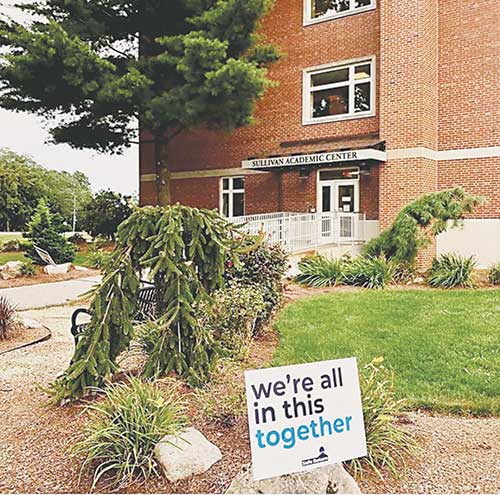
Several college students from North Reading, however, were encouraged to leave the familiarity of their homes only to spend the fall 2020 semester navigating their way around college campuses that became brand new all over again.
Monika Stantcheva, a junior at Boston College, described the campus dining hall as having been “completely reorganized with markers on the floor, so students could stay socially distanced.” Rachel Conley, a junior at Worcester State University, explained that almost everything about the university seemed different upon her return, with food options and hours of operations adjusted to follow proper CDC guidelines.
“They put up encouraging signs around campus saying happy things like ‘We got this’ and ‘Just keep swimming’ to lighten spirits, but the drastic changes in campus life were inescapable,” reflected Conley.
With libraries limiting seating and building capacity, many students could not enjoy the rituals of their normal routines, such as meeting friends for study group sessions or staying up late to complete homework in quiet, private corners by the bookshelves. Water fountains closed to public use, with small on-campus cafes following suit and dining hall services resorting to the bare minimum to keep students safe. Getting COVID-tested on a weekly basis quickly became the new norm.
More homework, technical difficulties
Additionally, some students reported having received more homework this past fall than they would in a typical semester, as well as experiencing more technical difficulties due to classes being held online. Conley found that because she and her roommate shared many of the same courses and had to use Zoom at the same time, an echoing effect proved to signify an early complication of the remote learning experience.
“Lagging, random disconnections, and more issues presented themselves to be common as the semester progressed,” she added.
Desolate campuses
Samantha Galvin, a current freshman at Harvard University, faced an unprecedented situation having to complete her first semester of college amidst the ongoing COVID-19 pandemic. As Harvard chose to only invite the freshmen to their campus in Cambridge this past fall, Galvin often felt distanced from the staff and student body at-large, having to navigate an environment that resembled more of a ghost town than a lively and vibrant atmosphere.
“It sometimes felt like there wasn’t anyone on campus. On a lot of the colder days or rainy days, you couldn’t find anyone. I don’t think I saw any adults aside from the cooking staff for the first two months of school other than online,” she stated.
Housing limitations put a noticeable damper on social gatherings, as many institutions decided to either completely restrict guest visitation or limit the number of guests per doom room. This evidently made it more difficult for students to see their friends, and for Galvin – a new underclassman – it became near impossible to make them.
“We couldn’t have guests in our rooms, and I was placed in a single. There was nowhere for us to really go to hangout; kids could only really meet outside, and even those gatherings were monitored,” she explained.
Growing lonely as a result of having to physically isolate from others appears to be a common thread shared amongst those who lived in their dorms this past fall. The fear of contracting COVID-19 was ever-present for many, especially those who experienced close encounters of their own.
Anxiousness over having to quarantine
Stantcheva revealed that two of her roommates were sent to isolation housing at Hotel Boston for a couple of weeks, which temporarily brought her normal six-person suite down to four members. For Conley, feelings of anxiousness regarding COVID-19 were never far, as she was placed into close-contact quarantine two times over the course of the fall 2020 semester for a total of four weeks, and always worried she could be sent back to isolated living at any moment.
Stantcheva and two of her roommates also work at the university gym on campus which, she explained, “raised a large threat in terms of getting COVID and giving it to our other roommates. We constantly had a lingering feeling we were always in danger.”
Unfortunately, due to the fear of cases spiking after Thanksgiving break, several schools decided to either finish the fall 2020 semester remotely or limit re-entry to those who only traveled within the state. Boston College was one such institution that offered students the option to return or remain at home, but for Nearing, the choice was easy to make.
“I decided to stay home because I did have a lot of anxiety about COVID. I loved being on campus, but I was nervous about returning after people had traveled for Thanksgiving, or potentially being in quarantine for Christmas if I caught COVID during the end of the semester,” she stated.
Bonding with roommates
Despite all of the trials and tribulations encountered this past fall, many North Reading undergraduates collectively acknowledge the positives that came out of a dark semester. As students were forced to spend more time in their own doom rooms, many were able to bond with roommates and create memories that they would not have made otherwise.
While the social scene may have been lackluster across many college campuses, underclassmen and upperclassmen alike often reminded their friends and peers to maintain social distancing protocols in an effort to keep everyone safe.
Green space campus conversions
Appreciation for the outdoors also caught hold early on; to encourage safe socialization practices, Boston College converted the grounds of an old gymnasium into a new green space to provide students with a beautiful area to reconvene.
Likewise, at Harvard University, students took advantage of the Charles River being right at their disposal across the street, going on walks in the afternoons and evenings with newly made friends and classmates.
Reflecting on the fall 2020 semester, Robert – like many others – feels a deeper gratitude for the little things in life, recognizing that she is now more open-minded about academic opportunities and the college experience in general. While she has yet to experience a full calendar year of campus life, she is happy that her time conducting school remotely has given her the chance to reach out to people in the surrounding community and make new connections.
In-person beats Zoom
As the general consensus appears to be that in-class discussions beat learning over Zoom, many are hopeful that more – if not all – of their classes will resume to an in-person format for the spring of 2021. Wagner will be attending some of his college courses in-person for the first time next semester and is looking forward to finally meeting his peers and professors face-to-face (or technically speaking, mask-to-mask).
With the promise of the COVID-19 vaccine now on the horizon, students like Galvin are remaining optimistic, believing strongly that if students follow all of the restrictions and guidelines schools will return to a state of normalcy by the fall of 2021. Since Galvin was able to secure housing for the spring, she is excited to meet more undergraduates and strengthen existing friendships.
Open up to others
And for those still trying to navigate college life amidst an ongoing pandemic, or those who are worried about what the next few months might bring, Galvin offers these words of wisdom:
“Talk to people about how you’re feeling, because a lot of other people are in the exact same boat. It will make you feel less alone when you share your feelings with others.”

